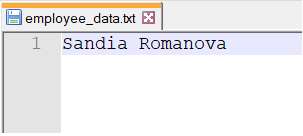Instance and class data
Object-Oriented Programming in Python

Alex Yarosh
Content Quality Analyst @ DataCamp
Core principles of OOP
Inheritance:
- Extending functionality of existing code
Polymorphism:
- Creating a unified interface
Encapsulation:
- Bundling of data and methods
Instance-level data
class Employee:
def __init__(self, name, salary):
self.name = name
self.salary = salary
emp1 = Employee("Teo Mille", 50000)
emp2 = Employee("Marta Popov", 65000)
name,salaryare instance attributesselfbinds to an instance
Class-level data
- Data shared among all instances of a class
- Define class attributes in the body of
class
class MyClass:
# Define a class attribute
CLASS_ATTR_NAME = attr_value
- "Global variable" within the class
Class-level data
class Employee: # Define a class attribute MIN_SALARY = 30000 #<--- no self.def __init__(self, name, salary): self.name = name # Use class name to access class attribute if salary >= Employee.MIN_SALARY: self.salary = salary else: self.salary = Employee.MIN_SALARY
MIN_SALARYis shared among all instances- Don't use
selfto define class attribute - use
ClassName.ATTR_NAMEto access the class attribute value
Class-level data
class Employee: # Define a class attribute MIN_SALARY = 30000def __init__(self, name, salary): self.name = name # Use class name to access class attribute if salary >= Employee.MIN_SALARY: self.salary = salary else: self.salary = Employee.MIN_SALARY
emp1 = Employee("TBD", 40000)
print(emp1.MIN_SALARY)
30000
emp2 = Employee("TBD", 60000)
print(emp2.MIN_SALARY)
30000
Why use class attributes?
Global constants related to the class
- minimal/maximal values for attributes
- commonly used values and constants, e.g.
pifor aCircleclass - ...
Class methods
- Methods are already "shared": same code for every instance
- Class methods can't use instance-level data
class MyClass: @classmethod # <---use decorator to declare a class methoddef my_awesome_method(cls, args...): # <---cls argument refers to the class # Do stuff here # Can't use any instance attributes :(
MyClass.my_awesome_method(args...)
Alternative constructors
class Employee:
MIN_SALARY = 30000
def __init__(self, name, salary=30000):
self.name = name
if salary >= Employee.MIN_SALARY:
self.salary = salary
else:
self.salary = Employee.MIN_SALARY
- Can only have one
__init__()
@classmethod
def from_file(cls, filename):
with open(filename, "r") as f:
name = f.readline()
return cls(name)
- Use class methods to create objects
- Use
returnto return an object cls(...)will call__init__(...)
Alternative constructors
class Employee:
MIN_SALARY = 30000
def __init__(self, name, salary=30000):
self.name = name
if salary >= Employee.MIN_SALARY:
self.salary = salary
else:
self.salary = Employee.MIN_SALARY
@classmethod
def from_file(cls, filename):
with open(filename, "r") as f:
name = f.readline()
return cls(name)

# Create an employee without calling Employee()
emp = Employee.from_file("employee_data.txt")
type(emp)
__main__.Employee
Let's practice!
Object-Oriented Programming in Python

